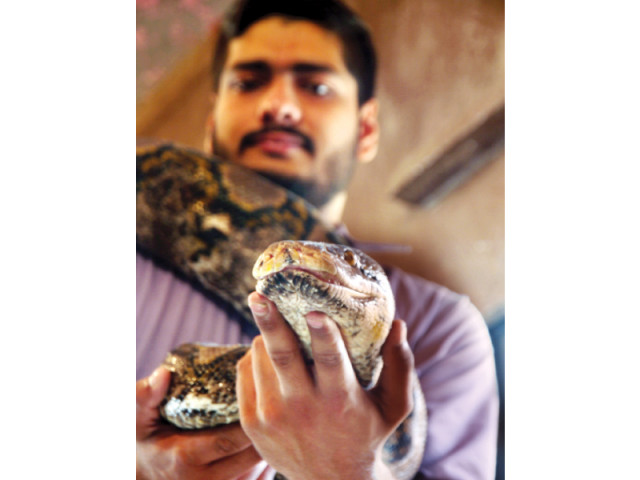‘Pet’ peeves: Collector of snakes boasts of a $9,000 addition
Hassan Hussain has imported 16 pythons, including a 20ft one, from the USA to keep as pets

The snake is often a symbol of evil in folklore, dreaded by most people, but four months ago, 21-year-old Hassan imported 16 pythons from Oklahoma City, USA, to keep as pets. Though he refused to disclose the total cost, he mentioned that they cost him between Rs1.6 and Rs1.7 million. “Just this one, which is the largest python in Pakistan, was for $9,000,” he said, gesturing to the female het albino reticulated python coiled around his neck.
“I’ve got two female het albino reticulated pythons, which I keep with that male Type 2 albino super tiger for mating, alternating them every three days,” he pointed to a sliding glass case in which a 13-feet long yellow python was sticking its tongue out and undulating its neck to attract the female.

“They take three to four months to lay eggs after mating, and 60 more days for the eggs to hatch. If the female gets pregnant, she will eat less and shed more skin,” he explained. Lifting a piece of dry snakeskin about 10 centimetres long, he said that shedding was something that was customary for snakes.
Hassan added that he also had 11 baby pythons, each measuring about a foot in length and having the potential to grow up to at least five or six feet.
Discussing their diet, he said that the largest female python ate one full-sized rabbit a week. “She slowly glides to the rabbit, grabs it with her bilateral mouth, which can open to thrice its actual size, coils around the mammal, squeezes it until it suffocates and then devours it,” he described. “Snakes swallow their prey whole.”
When Hassan was asked if any of his snakes had ever attacked him, he immediately rolled up his sleeves to show the scars caused when one of his pythons plunged its teeth into his arm. “He has bitten me twice out of fear,” he said. “Although the wounds bled, I did not rush to the hospital.”
“Hardly anyone comes to us for the treatment of snakes,” Dr Isma Gheewala, a veterinarian at Defence’s Animal Care Clinic, told The Express Tribune, adding that people here hardly kept reptiles as pets. “Although pythons are non-venomous, they do have the ability to kill humans, though it’s not something they often do.” She added, however, that the snake-keeper must have adequate training to be able to keep pythons of such sizes as pets.
“I got a No Objection Certificate from the Sindh Wildlife Department to allow me to keep them at home,” Hassan said. “I also got a permit to trade them.”
Javed Ahmed Maher, the chief conservator of the provincial wildlife department, told The Express Tribune that imported species could be kept as pets if one had the Certificate of Lawful Possession. “Pythons can legally be kept in residential areas since they are non-venomous,” he explained. “In my opinion, no major training is required to keep them, because you become familiar with their nature very soon.” He added that pythons could also be traded if one had a dealership licence.
Published in The Express Tribune, December 3rd, 2014.



















COMMENTS
Comments are moderated and generally will be posted if they are on-topic and not abusive.
For more information, please see our Comments FAQ